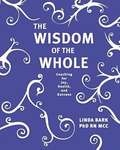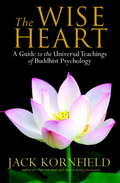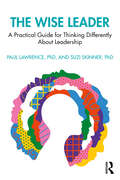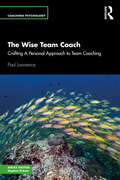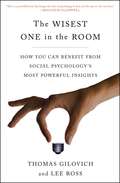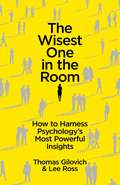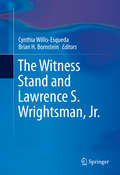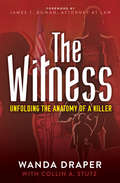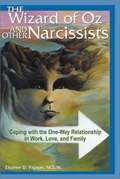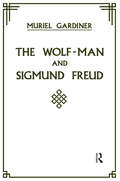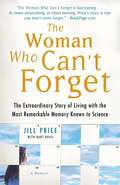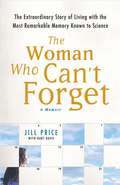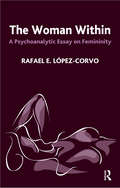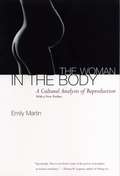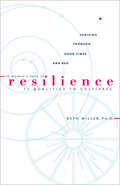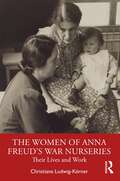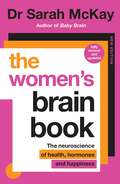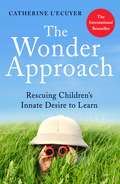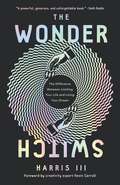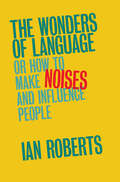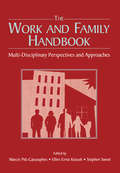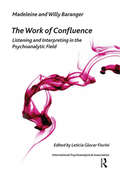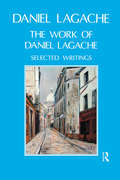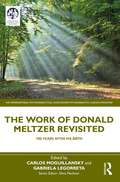- Table View
- List View
The Wisdom of the Whole: Coaching for Joy, Health, and Success
by Linda Bark<p>Learn all about holistic/integral coaching! If you are a professional who helps others to lead flourishing, happier lives, this book will help you become even more effective. If you are interested in learning about effective change for yourself, this book is also for you because of its fun and easy design, playful illustrations, and interactive exercises. <p>The Wisdom of the Whole invites people to look through multiple windows for exploration and action. The powerful mental tools described in this book are based on critical thinking, analysis, and planning. But we can’t stop there! The stories clients tell themselves as well as techniques such as imagery and affirmations, can help clients travel forward on a path to their goals. Ways for coaches and clients to employ intuition and the more subtle aspects of being add to the complete approach. Finding out how sense of purpose can impact motivation or shape an aspiration is also part of this model described here. The multidimensional approach enables people to move more quickly and easily toward their goals with greater authenticity, often eliminating false starts or wrong turns.
The Wise Heart: A Guide to the Universal Teachings of Buddhist Psychology
by Jack KornfieldFor over 2000 years, Buddhist psychology has offered invaluable insights into the nature of the heart and mind, and transformed the way many people around the world handle life's challenges. But the ancient texts on which these remarkable teachings are based can be difficult to penetrate for modern seekers. Now, drawing on his experience as a monk trained in Thailand, Burma and India, as well as his expert psychology practice, Jack Kornfield provides an accessible, definitive guide for Buddhists and non-Buddhists alike. This important new work is in the tradition of his classic works A Path with Heart and After the Ectasy, the Laundry, offering practical tools to coping with modern life and dealing with emotions such as fear, anger and shame. Kornfield also shares the illuminating stories of his students and fellow practitioners, as well as his own journey towards enlightenment, including his recovery from a violence-filled childhood. Here is a rare treasure that will give readers greater access to the secret beauty within - and without.
The Wise Leader: A Practical Guide for Thinking Differently About Leadership
by Paul Lawrence Suzi SkinnerThe Wise Leader offers readers a succinct perspective on wise leadership based on theory, practice, and the authors’ own experience. The five sections of the book describe the Wise Leader model, five mantras that distil the essence of wisdom for leading. Each section has a theoretical component, theory that the authors seek to bring to life through everyday examples, followed by practical ideas and guidance as to what you can next do in service of becoming a wiser, more effective leader. Each mantra then includes fresh perspectives for leadership development, aimed at supporting organisations globally to maximise their considerable investment in this critical area. This book is written for leaders at every level of an organisation, providing a perspective of wise leadership that lends itself to practical application. It can also be used by leadership development professionals, offering guidance on how to build practical programs to cultivate enhanced levels of wise leadership in your organisation.
The Wise Team Coach: Crafting A Personal Approach To Team Coaching (Coaching Psychology)
by Paul LawrenceBased on three years of meta- research into team effectiveness and coaching, this book explores some of the most common contradictions and debates around the topic of team coaching and presents readers with a framework to enable them to explore this field for themselves, reflecting on their own experience and drawing their own conclusions.Team coaching in organisations is still a relatively new discipline, with industry associations having only recently defined their first attempts to frame team coaching in the form of standard skills and competencies. As a new discipline we still see multiple perspectives on what team coaching is, and how it should best be practiced. The literature abounds with paradox and contradictions. Within this book Lawrence delves into these contradictions and debates, providing a framework to encourage readers to construct their own practice model. Covering both theory and practical application, this will be a useful guide for both experienced team coaches and those entering the field.
The Wisest One in the Room
by Thomas Gilovich Lee RossRenowned psychologists describe the most useful insights from social psychology that can help make you "wise": wise about why people behave the way they do, and wise about how to use that knowledge in understanding and influencing the people in your life.When faced with a challenge, we often turn to those we trust for words of wisdom. Friends, relatives, and colleagues: someone with the best advice about how to boost sales, the most useful insights into raising children, or the sharpest take on an ongoing conflict. In The Wisest One in the Room, renowned social psychologists Thomas Gilovich and Lee Ross ask: Why? What do these people know? What are the foundations of their wisdom? And, as professors and researchers who specialize in the study of human behavior, they wonder: What general principles of human psychology are they drawing on to reach these conclusions? They begin by noting that wisdom, unlike intelligence, demands some insight into people--their hopes, fears, passions, and drives. It's true for the executive running a Fortune 500 company, the candidate seeking public office, the artist trying to create work that will speak to the ages, or the single parent trying to get a child through the tumultuous adolescent years. To be wise, they maintain, one must be psych-wise. Gilovich and Ross show that to answer any kind of behavioral question, it is essential to understand the details--especially the hidden and subtle details--of the situational forces acting upon us. Understanding these forces is the key to becoming wiser in the way we understand the people and events we encounter, and wiser in the way we deal with the challenges that are sure to come our way--perhaps even the key to becoming "the wisest in the room."
The Wisest One in the Room: How To Harness Psychology’s Most Powerful Insights
by Thomas Gilovich Lee RossIn any room full of people, there tends to be one individual to whom others turn when they are in search of answers. This person has the most useful advice for facing life's daily challenges, the most enlightening views on world events, and the sharpest take on business dilemmas. They are the wisest one in the room.Taking us through modern psychology's five pillars wisdom, Gilovich and Ross give us a vital insight into the principles that underlie human behavior. Understand why it is so difficult to get someone to change their behavior. Learn how narrow our own individual perspectives truly are. And discover how we might be able to affect widespread change through the smallest alterations. A truly fascinating work, The Wisest One in the Room helps us to understand why people act as they do whilst also showing us how we can become more 'psych-wise' and improve our own lives as a result.
The Witness Stand and Lawrence S. Wrightsman, Jr.
by Brian H. Bornstein Cynthia Willis-EsquedaThis unique volume salutes the work of pioneering forensic psychologist Lawrence S. Wrightsman, Jr. , by presenting current theorizing and research findings on issues that define the field of psychology and law. Ongoing topics in witness behaviors, suspect identification, and juror decision making illustrate how psychology and law complement and also conflict at various stages in legal processes. The book also sheds light on evolving areas such as DNA exonerations, professional trial consulting, and jury selection strategies, and the distinct challenges and opportunities these issues present. Noted contributors to the book include Wrightsman himself, who offers salient observations on the field that he continues to inspire. Featured among the topics: The credibility of witnesses. Psychological science on eyewitness identification and the U. S. Supreme Court. False confessions, from colonial Salem to today. Identifying juror bias: toward a new generation of jury selection research. Law and social science: how interdisciplinary is interdisciplinary enough? Race and its place in the American legal system. With its diverse mix of perspectives and methodologies, The Witness Stand and Lawrence S. Wrightsman, Jr. will interest forensic researchers in academic and applied settings, as well as individuals working in the legal system, such as attorneys, judges and law enforcement personnel.
The Witness: Unfolding the Anatomy of a Killer
by Wanda Draper Collin A. StutzA professional behavioral witness to more than a hundred capital trials explores the making of a murderer. CSI shows us where a crime is committed. Forensic detectives show us how. But what really goes on in the mind of killer? What is it in each potential victim that sparks in them the urge to take a life? What are the reasons behind a quick thrill kill, or slow torture? Between choosing someone they know, or a stranger? As they stand before a jury, after reams of graphic evidence, the question is no longer whether or not they committed the unthinkable. The question posed to Wanda Draper, expert in behavioral science and child development, and key witness in more than a hundred high-profile trials, is why? The answer is all that stands between a sentence of life in prison or death row. In this unique true-crime investigation, Draper shares some of the darkest cases of her career. She sheds light on the personal circumstances and critical life events that perverted childhoods and brought convicted murderers to trial. She reveals how the past casts a grave shadow over one&’s future. And in doing so, explores one irrefutable fact: killers aren&’t born, they&’re made.
The Wizard of Oz and other Narcissists: Coping with the One-Way Relationship in Work, Love, and Family
by Eleanor PaysonEvery day headlines are filled with examples of narcissistic individuals in positions of power who are nothing more than impostors plundering and wreaking havoc on the lives of others. From the financial barons of Wall Street to our elected officials in government, we are confronted daily with narcissists and the self-serving systems that enable them. Helping people reclaim their lives from this sinister exploitative force is the mission behind Payson's book, The Wizard of Oz and Other Narcissists: Coping with the One-Way Relationship in Work, Love, and Family. Using simple metaphors from the American classic, The Wizard of Oz, Payson illustrates how Dorothy's journey captures all the seductive illusions and challenges that occur when we encounter the narcissist. Empowering the reader with the ABCs of unhealthy narcissism and the unique problems that occur when a person becomes involved with the narcissist, Payson gives step-by-step practical tools to identify, protect, and heal from these destructive relationships. Largely un-addressed in the psychology and self-help literature, this ground breaking book offers hope and help to those who have been drawn into these devastating relationships. She includes illuminating case studies that identify the problems that occur in the different types of relationships, from co-workers, to friends, to parents, to lovers. Readers employing these insights and skills will find new abilities to identify and protect against the narcissist's manipulations and take back control of their lives.
The Wolf-Man and Sigmund Freud
by Muriel GardinerIt is a well known that the Wolf-Man was the subject of what James Strachey described as 'the most elaborate and no doubt the most important of all Freud's case histories'. It is less well known that he was still living in Vienna more than half a century since his analysis with Freud. In this remarkable biographical account, the Wolf-Man comes alive not only through Freud's case history, which is reprinted in full, and Ruth Mack Brunswick's account of the follow-up analysis which she conducted, but also through his own autobiographical memoirs covering his childhood in Russia, his recollections of Freud, his marriage, and the circumstances of his life in Vienna after the First World War. The story of the Wolf-Man's later years is told by the editor of this volume, the author, who kept in close touch with him following the shattering suicide of his wife in 1938.
The Woman Who Can't Forget
by Bart Davis Jill PriceJill Price has the first diagnosed case of a memory condition called "hyperthymestic syndrome" -- the continuous, automatic, autobiographical recall of every day of her life since she was fourteen. Give her any date from that year on, and she can almost instantly tell you what day of the week it was, what she did on that day, and any major world event or cultural happening that took place, as long as she heard about it that day. Her memories are like scenes from home movies, constantly playing in her head, backward and forward, through the years; not only does she make no effort to call her memories to mind, she cannot stop them. The Woman Who Can't Forget is the beautifully written and moving story of Jill's quest to come to terms with her extraordinary memory, living with a condition that no one understood, including her, until the scientific team who studied her finally charted the extraordinary terrain of her abilities. Her fascinating journey speaks volumes about the delicate dance of remembering and forgetting in all of our lives and the many mysteries about how our memories shape us. As we learn of Jill's struggles first to realize how unusual her memory is and then to contend, as she grows up, with the unique challenges of not being able to forget -- remembering both the good times and the bad, the joyous and the devastating, in such vivid and insistent detail -- the way her memory works is contrasted to a wealth of discoveries about the workings of normal human memory and normal human forgetting. Intriguing light is shed on the vital role of what's called "motivated forgetting"; as well as theories about childhood amnesia, the loss of memory for the first two to three years of our lives; the emotional content of memories; and the way in which autobiographical memories are normally crafted into an ever-evolving and empowering life story. Would we want to remember so much more of our lives if we could? Which memories do our minds privilege over others? Do we truly relive the times we remember most vividly, feeling the emotions that coursed through us then? Why do we forget so much, and in what ways do the workings of memory tailor the reality of what's actually happened to us in our lives? In The Woman Who Can't Forget, Jill Price welcomes us into her remarkable life and takes us on a mind-opening voyage into what life would be like if we didn't forget -- a voyage after which no reader will think of the magical role of memory in our lives in the same way again.
The Woman Who Can't Forget: The Extraordinary Story Of Living With The Most Remarkable Memory Known To Science
by Bart Davis Jill PricePeople might envy someone with such an extraordinary memory that she has been studied by neuroscientists, until they learn that Jill Price's ability extends only to details of her own life, sometimes haunting her, and does not to apply to memorizing facts. In collaboration with an established writer, this Los Angeles resident relates how she has coped since adolescence with hyperthymestic syndrome (defined in the glossary), in the context of current understanding of how memory works. This first-known case was documented in a 2006 journal article.
The Woman Within: A Psychoanalytic Essay on Femininity
by Rafael E. Lopez-CorvoAlthough it is quite possible that many will consider this book irreverent or disrespectful of ideas or institutions, the author is certain that they will also perceive it as a defender of women and their unquestionable transcendence throughout history. The main ideas the author now shares publicly, are ones the author has considered for many years: the classification of the 'Eves', the masochistic character of women, the concept of giraffe women, etc.. Other ideas appeared afterwards, some at the last moment, as the author enjoyed the company of friends, who frequently and generously lend their time to discuss with me their own opinions... the author believes that there is a universal feminine principle just as there is a masculine one, the difference remains in the fact that, from the very beginning of creation, everything about man has already been said and nothing continues to be undisclosed, whereas woman, is an untold story yet to be discovered.
The Woman in the Body: A Cultural Analysis of Reproduction
by Emily MartinMartin's analysis of the images that surround the female body in American culture contrasts the views of medical science with those of women from many social and economic backgrounds. In particular she stresses how metaphors of mass production, with their emphasis on machine-like regularity and efficiencies of scale, inform medical descriptions of women's bodies, frequently to the detriment of women's image of themselves and their life's purpose. Martin teaches anthropology at Princeton U. Annotation c. Book News, Inc., Portland, OR (booknews.com)
The Woman's Book of Resilience: 12 Qualitities to Cultivate
by Beth MillerKeep thriving through good times and bad: “[An] excellent self-help manual . . . Miller's program is sensible, and her tone warm and positive.” —Publishers WeeklyPsychologist Beth Miller has helped hundreds of people in her therapeutic practice to not only survive life crises but become deeper, more powerful, and more authentic human beings. Packed with information and exercises, this smart, often funny, book can help women thrive amid life’s ups and downs—from trauma and loss to daily disappointments. When we cultivate resilience, we mine the awful, or merely annoying, experiences in life to find meaning and purpose.The Woman's Book of Resilience is an accessible, practical guide to bouncing back, to go to the edge of life and come back with heart and soul elevated, to be able to take sure and steady steps over rocky terrain. Miller offers twelve qualities that help women develop and learn resilience, and shows how to cultivate them:Admit and embrace vulnerability * Increase the ability to connect * Find manageable parts of the problem * Discover your needs and get them met * Recognize your gifts and talents * Develop the ability to say no and set limits * Practice transforming resentment and forgiving * Use your sense of humor * Use the power of staying and leaving * Find meaning in crisis * Endure suffering through crisis * Stand strong alone and rely on othersWith case histories, stories, and a foreword by June Singer, this is a “trustworthy guide to living a more satisfying, fulfilling life no matter what your circumstances” (Lauren Artress, author of Walking a Sacred Path).
The Women of Anna Freud’s War Nurseries: Their Lives and Work
by Christiane Ludwig-KörnerIn this volume, Christiane Ludwig-Körner describes the lives and work of the staff members of the War Nurseries set up and run by Anna Freud and Dorothy Burlingham during the Second World War.The Women of Anna Freud’s War Nurseries looks in turn at each of the women who helped run the homes in Hampstead: Alice Goldberger, Sophie and Gertrud Dann, Manna Friedmann, Anneliese Schnurmann, Ilse Hellman and Hansi Kennedy. As young women, they narrowly escaped the Holocaust and dedicated themselves to children who had suffered the same fate. Few arrived with any knowledge of psychoanalytic theories or methods; this volume charts their education from Freud and Burlingham, which eventually lead to both Freud’s independent psychoanalytic child therapy training and the young women’s embarkment on careers as professional analysts. Using case studies throughout, Ludwig-Körner illustrates the intense relationships often experienced between children in care and their analysts/carers, and uses the children of the War Nurseries as examples for how contemporary psychoanalysts can work with children today.This book is essential reading for psychoanalysts, especially those working with children, as well as scholars and professionals interested in the history of child analysts and childhood trauma.
The Women's Brain Book: The neuroscience of health, hormones and happiness
by Dr Sarah McKayFor women, understanding how the brain works during the key stages of life - in utero, childhood, puberty and adolescence, pregnancy and motherhood, menopause and old age - is essential to their health. Dr Sarah McKay is a neuroscientist who knows everything worth knowing about women's brains, and shares it in this fascinating, essential book.This is not a book about the differences between male and female brains, nor a book using neuroscience to explain gender-specific behaviours, the 'battle of the sexes' or 'Mars-Venus' stereotypes. This is a book about what happens inside the brains and bodies of women as they move through the phases of life, and the unique - and often misunderstood - effects of female biology and hormones. Dr McKay give insights into brain development during infancy, childhood and the teenage years (including the onset of puberty) and also takes a look at mental health as well as the ageing brain. The book weaves together findings from the research lab, case studies and interviews with neuroscientists and other researchers working in the disciplines of neuroendocrinology, brain development, brain health and ageing.This comprehensive guide explores the brain during significant life stages, including:In uteroChildhoodPubertyThe Menstrual CycleThe Teenage BrainDepression and AnxietyPregnancy and MotherhoodMenopauseThe Ageing Brain
The Women's Brain Book: The neuroscience of health, hormones and happiness
by Dr Sarah McKayFor women, understanding how the brain works during the key stages of life - in utero, childhood, puberty and adolescence, pregnancy and motherhood, menopause and old age - is essential to their health. Dr Sarah McKay is a neuroscientist who knows everything worth knowing about women's brains, and shares it in this fascinating, essential book.This is not a book about the differences between male and female brains, nor a book using neuroscience to explain gender-specific behaviours, the 'battle of the sexes' or 'Mars-Venus' stereotypes. This is a book about what happens inside the brains and bodies of women as they move through the phases of life, and the unique - and often misunderstood - effects of female biology and hormones. Dr McKay give insights into brain development during infancy, childhood and the teenage years (including the onset of puberty) and also takes a look at mental health as well as the ageing brain. The book weaves together findings from the research lab, case studies and interviews with neuroscientists and other researchers working in the disciplines of neuroendocrinology, brain development, brain health and ageing.This comprehensive guide explores the brain during significant life stages, including:In uteroChildhoodPubertyThe Menstrual CycleThe Teenage BrainDepression and AnxietyPregnancy and MotherhoodMenopauseThe Ageing Brain
The Wonder Approach: Rescuing Children's Innate Desire to Learn
by Catherine L'Ecuyer'This book is a must-read for parents and educators who want to refocus children's attention to one of the greatest secrets to long-term happiness - discovering the extraordinary in the ordinary' - Jessica Joelle Alexander, co-author of The Danish Way of ParentingChildren of the last twenty years have grown up in an increasingly frenzied and demanding environment so that, on one hand, education has been rendered more complicated, and on the other, the essentials have been lost to view. In order to ensure their future success, parents often feel that they must fill their children's schedules with endless activities that cause leisure, spontaneous activity, and the experience of nature, beauty and silence, to fade out of their lives.This veritable race toward adulthood distances children more and more from the natural laws of childhood. A constant stream of loud and flashy stimuli disturbs the only true and sustainable learning that exists in them: that of calmly and quietly discovering the world for themselves and at their own pace, with a sense of wonder that goes beyond mere curiosity for the unknown or interest in novelty.In a world such as this, it can be a daunting task for a parent or educator of young children to discern how to best raise their children. Catherine L'Ecuyer offers clarity, drawing attention to the findings of many studies of the last few decades on the effects of screen use, overstimulation and mechanistic approaches to education on young children, and suggests time exploring the real world, more silence and the 'Wonder Approach' as remedies. Learning should be a wondrous journey guided by a deep reflection on what the natural laws of childhood require: respect for children's pace and rhythms, innocence, sense of mystery and thirst for beauty.
The Wonder Switch: The Difference Between Limiting Your Life and Living Your Dream
by Harris III"A powerful, generous and unforgettable book." - Seth Godin"A wondrous lens on healing ourselves and our world in this strangest and hardest of times." - Krista TippettWe are all born with the wonder switch in the "on" position, but somewhere along the way, our wonder is crushed. And that's when we begin to live out of a self-limiting mindset that shuts down our sense of possibility and purpose.Yet reclaiming your wonder--and with it, your life--is within reach. In The Wonder Switch, join world-renowned storyteller and professional illusionist Harris III in a journey to bring you back to the magic you fear you've lost--not the sleight of hand he performs across world stages, but real magic: love, hope, joy, belonging, meaning, and purpose.One of wonder's greatest powers is that it changes the stories we tell ourselves, writes Harris. With the help of his power-packed Transformation Map, you'll gain the tools you need to switch from the old story that leaves you unfulfilled to the new story that will make you a healthier, happier, all-around better human being.In this book, you'll discover:The surprising science behind the stories we tell ourselves and how they shape our livesPractices for "righting" your story from a broken narrative to a restored narrativeThe secret to breaking out of a Limiting Mindset and developing a Wonder MindsetPractices for moving from complacency to curiosityWhy worry is a misuse of your imagination, and how to kick the habit
The Wonders of Language
by Ian RobertsIan Roberts offers a stimulating introduction to our greatest gift as a species: our capacity for articulate language. We are mostly as blissfully unaware of the intricacies of the structure of language as fish are of the water they swim in. We live in a mental ocean of nouns, verbs, quantifiers, morphemes, vowels and other rich, strange and deeply fascinating linguistic objects. This book introduces the reader to this amazing world. Offering a thought-provoking and accessible introduction to the main discoveries and theories about language, the book is aimed at general readers and undergraduates who are curious about linguistics and language. Written in a lively and direct style, technical terms are carefully introduced and explained and the book includes a full glossary. The book covers all the central areas of linguistics, including phonetics, phonology, morphology, syntax, semantics and pragmatics, as well as historical linguistics, sociolinguistics and psycholinguistics.
The Work and Family Handbook: Multi-Disciplinary Perspectives and Approaches
by Ellen Ernst Kossek Marcie Pitt-Catsouphes Stephen SweetThe Work and Family Handbook is a comprehensive edited volume, which reviews a wide range of disciplinary perspectives across the social sciences on the study of work-family relationships, theory, and methods. The changing demographics of the labor force has resulted in an expanded awareness and understanding of the intricate relations between work and family dimensions in people's lives. For the first time, the efforts of scholars working in multiple disciplines are organized together to provide a comprehensive overview of the perspectives and methods that have been applied to the study of work and family. In this book, the leading work-family scholars in the fields of social work, psychology, sociology, organizational behavior, human resource management, business, and other disciplines provide chapters that are both accessible and compelling. This book demonstrates how cross-disciplinary comparisons of perspective and method reveal new insights on the needs of working families, the challenges faced by those who study them, and how to formulate policy on their behalf.
The Work of Confluence: Listening and Interpreting in the Psychoanalytic Field (The International Psychoanalytical Association Psychoanalytic Ideas and Applications Series)
by Madeleine Baranger Willy BarangerThis book expands the authors' oeuvre to the English language and, consequently, to a broader spectrum of readers. These contributions represent a pioneering work of great interest to the field of psychoanalysis. Their proposals concerning the concept of psychoanalytic field, "basic unconscious fantasy", bastion and insight, address the whole question of the analytic situation and anticipate current debates.
The Work of Daniel Lagache: Selected Papers 1938-1964
by Daniel LagacheIn 1947, the author founded the Library of Psychoanalysis and Clinical Psychology at Presses Universitaires de France, and forty-two volumes have appeared, by French and foreign authors, nine of them works or reprints of articles by Freud. It was here that he produced his precise and important The Language of Psychoanalysis (1968), which has been translated into many languages. The Works of Daniel Lagache English edition in one volume is a selection of those texts that are most representative of the psychoanalytic thinking of the author. It is a thinking that is rich in epistemology, ensuring that psychoanalysis is set in relationship to behaviorism and clarifies its status as an "exact science". It deserves to provoke a lively response from the English speaking public.
The Work of Donald Meltzer Revisited: 100 Years After His Birth (The International Psychoanalytical Association Psychoanalytic Classics Revisited)
by Carlos Moguillansky Gabriela LegorretaThe Work of Donald Meltzer Revisited: 100 Years After His Birth returns to and reassesses the contributions of Donald Meltzer, one of the most significant disciples of Melanie Klein and who was deeply inspired by Wilfred Bion.
